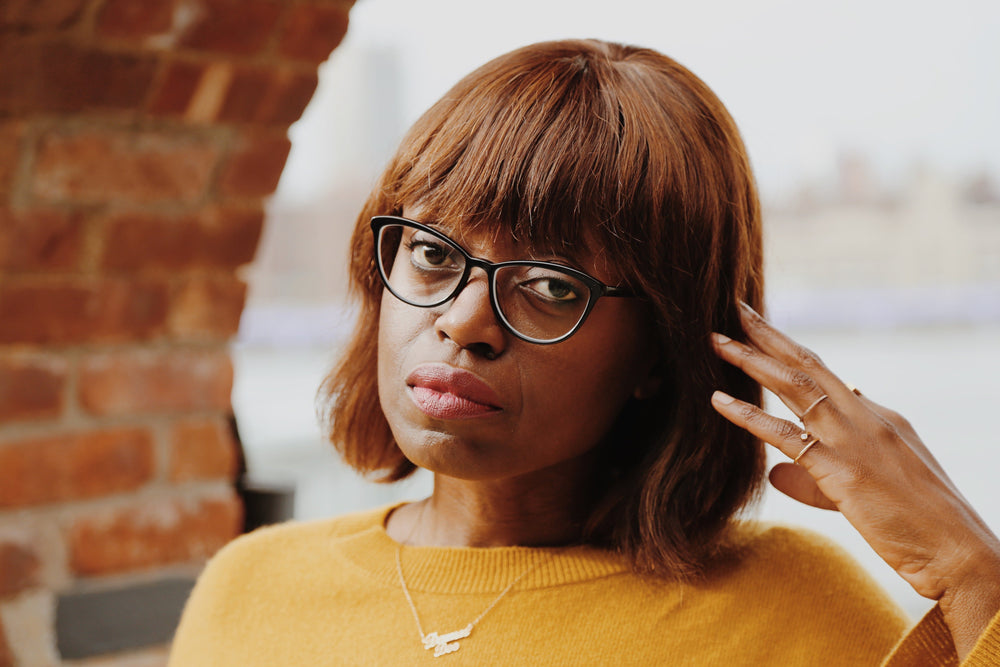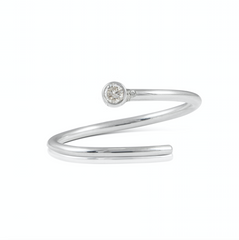Dee Poku On Navigating A Career Through Film, Fashion & Entrepreneurship
Posted by Shiffon Co. on

This feature is part of our series on members of our community who inspire us. From entrepreneurs, stylists, and consultants starting their own businesses to executives changing the game at the highest levels, we’re lucky to be able to learn from these incredible role models.
In that vein, half the profits from our Duet Pinky Rings fund seed grants for entrepreneurs around the world. Each ring is a symbol of a pinky pledge to pay it forward to support women & a connection between each member of our community. Make your own pinky pledge here.
Dee Poku seems like she’s done it all. She’s worked in fashion, film, and most recently founded her own venture, WIE (Women: Inspiration and Enterprise). Noticing a lack of space for professional women to connect, ask for advice, and be supported with a peer to peer network, she put together a conference designed to foster just that. When it succeeded beyond her expectations, she realized that there was a real opportunity there. Now, WIE hosts a variety of events from conferences to dinners, and has an offshoot in The Other Festival specifically for female founders. We got the chance to speak with Dee to learn about her journey, get career advice, and check out her jewelry!

Tell us about yourself and how you got to where you are today.
I'm the founder of a women's leadership network called WIE [Women: Inspiration and Enterprise]. It's an organization that exists to help women get connected to one another and give them the tools they need to succeed in their careers. It's a mix of founders and company executives. It's sort of dynamic, we throw a lot of great events, and it's just a really kind of cool place for creative women in particular.
I started my career in the fashion industry and then the media industry. Most of my career was in movies, working on the marketing. My role was promoting and marketing movies, finding the right audience for them, and as a moviegoer and lover it was great. I loved doing that.
WIE actually started off as kind of a side hustle. I've always been a bit of a connector; I love bringing women together. I love helping women do business together. So that inspired the very first WIE event, a symposium — a conference. That first event was incredibly successful, beyond our expectations. And so we were like "Ah!" There was something there. Women were looking for these networking opportunities and looking for ways to connect with business leaders and mentors. So it just evolved from there, from being a conference, to monthly events, to dinners. So we find lots of different connection points to give women the tools and access to succeed in their careers.
What was the process like of getting WIE off the ground?
Getting it started was really a process of leveraging my relationships and network. As I said I came from fashion, I came from film, so I already had a pretty decent network. Putting on that first event was really about who could we get to commit first and then building the blocks from there. At first there were a couple of people committed, then there was sort of a ricochet effect, and we managed to put a really great speaker list together. And I have a marketing background, so I'm very strong on branding and marketing and how to get traction around the events I do. I know how to get people excited. It was something that was a combination of people in my network, using my prior knowledge and experience and background to build the event.
You also started the Other Festival — is that part of WIE or was it a separate venture?
So WIE honestly was designed to create something that I wished I had when I was a woman navigating corporate culture and not having people I could ask for advice, or mentors, or a peer to peer network. I wanted to create something that would address that need for women. So it's sort of aimed at women executives. And then the Other Festival really was an evolution of what we already were doing. I also noticed the increasing number of women who were starting businesses who also needed support in sort of building their businesses, raising money, creating awareness, building their brand. The Other Festival was really created to support the founder community.

Did you know what you wanted to do when you were younger? How did you begin your career in fashion?
You know, I didn't. I actually wanted to be a dancer. And you know, I'm the child of immigrant parents, so that was not happening. So I kind of followed the path that my parents had mostly set for me which was to get to college and study a topic that would get me a good job. And then it was only after I graduated. I graduated from university with a degree in Math. But I suddenly thought, I don't want to be a banker or an accountant, which is the path that I was on. So I sort of rebelled at that point, and fell into fashion, which had been an interest of mind, but I decided to give it a try short term. Eventually it wasn't for me and I found my true calling in the film industry. But I definitely always say to women, and young women in particular, that you don't have to know exactly where you want to be when you're leaving college. I think you should gravitate towards the thing you most enjoy doing and is practical for you. Get experience, get to know the world, get to know what's out there, and then build from that. I know women in their 30s and 40s who are still changing careers and moving around. So I think it's all about getting a job in something as close to what you like as possible, get some experience, get to know what's out there for you.

Something people struggle with is transitioning out of a career that isn’t the best fit for them — how did you transition to film?
When I transitioned from fashion, I was fairly young in my career. I didn't know necessarily lots of people, and I did a lot of cold emailing. I did my research, I found companies that looked interesting to me, and I cold emailed. Lots of people didn't get back to me, but a few did, and that's how I got my first job in film. As you get further along in your career, it becomes much more about the relationships you have with people. So subsequent jobs came from the people I met, people I worked with. Just ensuring that I was building really strong relationships along the way, that ended up sort of helping me with my career.
How does entrepreneurship compare to your previous jobs?
I mean I love it. I love what I did before, and I love what I do now. I had to do what I did before to get to where I am today. I didn't start off as a particularly entrepreneurial person, but once I had the experience that I felt I needed then I felt more comfortable making meat for other people.
Some people don't want to work for anyone else. They need the freedom and autonomy and they want to get straight to entrepreneurship. Now that I've done it, I love the freedom. I love working for myself. I love going down this path and being in charge of my own destiny. It's not easy, especially with a kid, but it's also very fulfilling.
Were there any critical challenges you faced?
I think that every entrepreneur faces challenges, just keeping your business afloat. I definitely had some tough times when I thought I was going to go under, and somehow survived. I think it's particularly difficult for female founders and founders of color to raise money to help them build and grow. So it's just been learning how to get better at asking for money, pitching and presenting myself -- just fundraising and being able to pay your bills is the perennial challenge
What would you say is the number one skill needed to be an entrepreneur?
Tenacity. I think you have to be tenacious. I don't think you can survive otherwise. You head no so often, there are so many peaks and valleys, you have to have the strength to stay the course. It's not for the faint of heart, that's for sure.

Do you have advice for young women who want to do what you're doing?
I would say build your network. I don't think I would have achieved any modicum of success if I hadn't been surrounded by incredible supporters and advocates. I just know that whatever I happen to need, I can pick up the phone and email someone and someone who can help me answer my question, connect me to the right person.
And the further you get along in your career, the more important the relationships become. You cannot succeed without a strong network of relationships. And it starts early, it starts in college, it starts in school. The people in your class could be the heads of companies, in government positions, in influential positions across every sector and it's really important to build those relationships and start early. That would be my advice to anyone.
On jewelry
My husband and I got married very spontaneously. So I had an engagement ring, but I never really had a wedding ring. We just kind of got around to the ring part. And he just gave me a ring over the holidays - a beautiful antique ring that he had redesigned for me, and it's incredibly meaningful. It's like a vintage Tiffany ring, and it's really beautiful.

My family's from Ghana, so there are some pieces from Ghana that were passed down in my family, some traditional Ghanian jewelry and gold that I really love.
The red spider earrings are by Jennifer Behr. She’s known for her wonderful hairpieces but recently branched out into jewelry. These caught my eye immediately. The tiara is also by Jennifer Behr. I’ve always loved tiaras. Guess I never got over my princess desires.
The square gold rings are by Agmes. I discovered them when they had a pop up at our annual female founder event The Other Festival. The necklace was created by Joan Creative, the only female owned ad agency in New York. Every time I put it on I think, damn.
This interview has been edited and condensed for clarity.
Visit startupgirlfoundation.org to learn more about the companies our Duet Pinky Ring is currently funding. Make your own pinky pledge to pay it forward and support women by purchasing a Duet Pinky Ring here.


